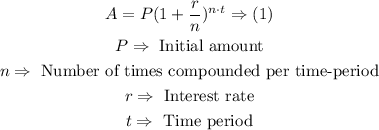Answer:

Step-by-step explanation: The principal amount of $11,000 Is deposited in an account and it is compounded on daily basis at the interest rate of 3%, the formula used to solve this problem is as follows:

Substituting the knowns in the formula (1) gives the answer as follows:

So after 38 years, the amount in the account will be $34,430.